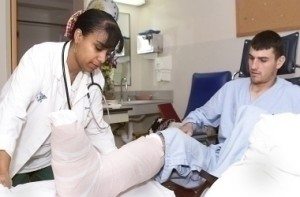Orthopedic nursing is a specialty that focuses on the treatment and prevention of musculoskeletal disorders or injuries.
What Does an Orthopedic Nurse Do?
Everyone suffers from some sort of musculoskeletal injury at some point, and the healing process is often long and somewhat painful. While orthopedic physicians may prescribe a therapy regimen or painkillers, orthopedic patients may need additional help with improving their quality of life and managing day-to-day tasks with minimal pain.
Featured Programs
This is where orthopedic nurses come in. These people dedicate their nursing careers to improving the lives of those suffering from both acute injuries and chronic conditions involving the musculoskeletal system. Orthopedic nurses need to have a grasp of the orthopedic specialty so they can better understand patient needs.

History of Orthopedic Nursing
Nursing is an ancient profession, but orthopedic nursing dates back to Victorian England. The field’s founder, Dame Agnes Hunt, was a nurse who found herself chronically suffering from septic arthritis in her hip. Hunt understood the trials of living with constant musculoskeletal pain. So, she spend her career improving the lives of both injured soldiers and crippled children affected by orthopedic conditions. Today, the field has expanded to include a variety of subspecialties and practice settings.
What Education do Orthopedic Nurses Need?
As is the case with all nursing professions, orthopedic nurses must pass their Boards for either the RN or LPN/LVN degree. This is a minimum requirement, however, and many orthopedic nurses choose to become certified in their specialty.
So, orthopedic nurse education can be at minimum a two-year degree. However, those interested in career advancement and a higher orthopedic nursing salary often complete a BSN or MSN.
What Orthopedic Nurse Certification Are There?
The Orthopedic Nursing Certification Board offers the main certification exam taken to illustrate a nurse’s competency in the field. This credential is the Orthopedic Nurse Certified and demonstrates proficiency in the field.
There are also options available for those who want to enter a subspecialty within the field. Two advanced nursing certifications are the Orthopedic Nurse Practitioner (ONP-C) and Orthopedic Clinical Nurse Specialist (OCNS-C). For many, the optimal career path involves working as an OCN and then moving to one or both of the advanced certifications.
Orthopedic Nurse Job Responsibilities
Because there are so many settings where orthopedic nurses work, job responsibilities can vary greatly. While many orthopedic nurses work on staff at a hospital or other practice, some may choose to work in management, whether that management is of nursing staff or of an entire practice.
Others may opt to work relatively independently as orthopedic nurse practitioners or as orthopedic nursing educators in order to further the field. Alternatively, some nurses prefer research over clinical work and work full-time as medical researchers.
Where do Orthopedic Nurses Work?
This is a specialty that can involve any number of work settings. Patients have orthopedic issues in all phases of life, from newborns to the elderly. Therefore, orthopedic nurses work in a variety of settings. In addition, musculoskeletal problems range from acute, life-threatening injuries to long-term pain in need of management.
As mentioned earlier, work responsibilities vary and depend on what an orthopedic nurse chooses as a specialty. In acute-injury care nurses work in ERs, trauma units, and operating rooms. In these settings, they assist physicians and also provide pain management to the patient.
Orthopedic Nurses in Oncology Departments
Several types of cancer adversely affect bone health and musculoskeletal comfort. So, orthopedic nurses also work in oncology departments and treat cancer patients. Nurses who deal with orthopedic issues on a less acute scale work in gerontology and rehabilitation units. They may even work for home health agencies. In this capacity, orthopedic nurses visit patients in their homes and provide medical care. Additionally, they monitor and alleviate orthopedic pain.
For those who want to work as educators, working at a college or university teaching nursing may be an option. Some nurses who choose this path opt to get additional graduate degrees, and many work clinically before beginning work as a nurse educator.
Orthopedic Nurse Professional Associations
Membership in a professional society is not required. However, many orthopedic nurses join the National Association of Orthopedic Nurses or NAON. The association helps members stay up-to-date with the latest trends in the field. They also receive the NAON journal.
In addition, the NAON has several committees and task forces designed to help advance the field as well as help individual nurses succeed. The NAON Early Career Nurse Committee ensures that new nurses have a voice in the national orthopedic nursing conversation. In addition, it also provides resources and mentorships to encourage and support those new to the field.
The ten-member NAON Education Committee designs educational courses, textbooks, and tools. These committee members have two- to three-year tenure, and most NAON members are eligible to apply. Research committees exist to help offer a guiding focus in the medical research done by the community and its members. Other committees include leadership search and local affairs committees – these ensure the organization operates smoothly at every level.
Is Orthopedic Nursing a Good Job?
The orthopedic nursing field is filled with individuals with a commitment to science and to helping others through difficult times. The best nurses are able to keep a levelheaded, scientific focus while still managing to be attuned to patient needs. A balance of technical skill and personal compassion will serve any potential orthopedic nurse well.
Whether someone wants to work part-time in a clinical setting or devote his or her life to the field of orthopedic nursing, he or she will be entering into a field that is vital for the health, comfort, and safety of millions.
Related: